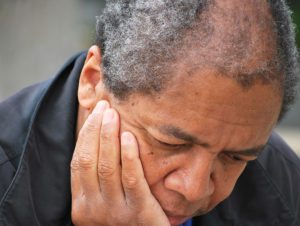Anxiety and your Aging Parent

Home Care in Cascade MI: Anxiety and your Aging Parent
According to an article in Geriatrics and Aging, late-life anxiety is considered a “geriatric giant” because it is “twice as prevalent as dementia among older adults, and four to eight times more prevalent than major depressive disorders, causing significant impact on the quality of life.” As a caregiver, it’s important to be aware of the challenges faced with the elderly and anxiety including recognizing the problem and dealing with it.
Anxiety and the Elderly
Anxiety often goes undiagnosed in the elderly for a number of reasons. As they age, multiple disorders or diseases may become apparent, masking or minimizing the symptoms associated with anxiety. Medications may also produce some side-effects that mimic those of anxiety. The elderly seem to be affected by anxiety in a different way than younger people—experiencing more physical symptoms and less emotional disturbances.
To be diagnosed with generalized anxiety disorder, a patient must meet these criteria: excessive anxiety or worry on most days of the week and three or more additional symptoms which include restlessness, fatigue, difficulty concentrating or sleep disruption. Other forms of anxiety include panic disorder and obsessive compulsive disorder and are not as common in the elderly.
What to Watch Out For
There are some specific cues to be aware of that may suggest your parent is suffering from anxiety. Depression and anxiety often go hand-in-hand, so it is important to be aware of both conditions.
- Increasing reluctance to go out of the house and avoiding social interactions.
- Excessive worry that seems out of context or disproportionate to reality.
- Increasing medication or alcohol intake.
- Apathy, frequent crying, change in sleep or eating patterns.
Treatment
Cognitive Behavioral Therapy (CBT) has proven beneficial for the elderly. This type of therapy often consists of relaxation techniques, restructuring—replacing anxiety-producing thoughts with realistic, less catastrophic ones, and exposure to specific situations that produce anxiety. A review by the International Cochrane Collaboration found that 46 percent of elderly patients diagnosed with anxiety received relief from CBT.
Medications are another option. These include buspirone and antidepressants. Extra care must be taken with the elderly due to the other medications they may take that can interact with drugs for anxiety. In addition, the side-effects of certain medications may be even more noticeable and dangerous to the elderly. As an example, serotonin reuptake inhibitors (SSRIs) may increase the risk of bone fractures.
Home Care
Increasing social isolation may make matters worse. To ensure your loved one remains engaged and keeps their mind on activities at hand, consider obtaining the services of a home care provider. They can accompany your parent on relaxing walks, provide social interaction, play crosswords and card games, and help your parent with the gift of companionship while assisting with the everyday activities of living.
If you or someone you know needs home care in Cascade, MI, contact Gauthier Family Home Care. We provide quality and affordable home care services in our community. Call us at (616) 258-2300 for more information.
Resources
http://www.medscape.com/viewarticle/579825_2
http://www.health.harvard.edu/newsletter_article/Treating-generalized-anxiety-disorder-in-the-elderly
- Ensuring a Smooth Transition From Hospital to Home - June 4, 2025
- Caregiver of the Month – June 2025 - June 2, 2025
- Common Sense Summer Tips for Seniors to Help Them Beat the Heat - May 28, 2025

